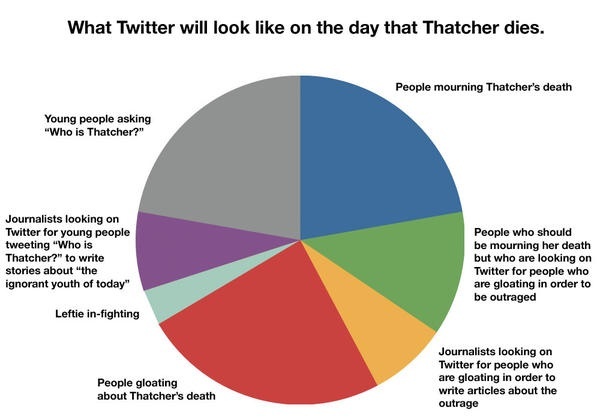- Politics
- Announcements Wahlfieber-Team
- USA (English - German)
- Politics Switzerland
- Upcoming Markets
- Polls and results
- Election analyses Germany
- Election analyses Austria - Switzerland
- European election analyses
- International election analyses
- Presidential election analyses
- Polls and Results (USA 2020)
- Sports & other topics
- Interview-Forum
Margaret Thatcher 1925-2013
-
I couldn't help laughing at all that right wing guff. She doubled unemployment and kept it at over three million for over a decade and still her supporters claim she was an economic success. She wasn't.
Widdewiddewitt und so. Mal die Fakten:

http://newsimg.bbc.co.uk/media/images/41029000/gif/_41029104_unemployment416.gif
-
Eine hübsche, wenn auch küchenpsychologische Erklärung dafür, warum die Briten sich drei Amtszeiten "gönnten". Spannend, warum konservative Duran-Duran-Fans, die mit Aktenköfferchen in die Schule kamen, heute musikalisch dazu gelernt haben. ;-)
http://www.spiegel.de/kultur/musik/margaret-thatcher-in-der-popkultur-der-achtzi ger-a-893152.html
Lange Jahre konnte sich jemand wie der Soziologe Stuart Hall die Popularität Thatchers nur mit einem masochistischen Zug der Briten erklären, einer geheimen Vorliebe dafür, von der Nanny ohne Pudding ins Bett geschickt zu werden. Doch ein Film wie "The Iron Lady" zeichnete Thatcher in sanfteren Farben - bis zur Geschichtsklitterung. Und eine neue Generation von Tory-Politikern wie David Cameron brüstete sich mit einer musikalischen Vorliebe für die ideologischen Gegner von einst, wie The Smiths oder The Jam.
Doch das weckte den alten Kampfgeist: Die beiden Smiths-Köpfe Morrissey und Johnny Marr, die sich sonst auf wenig einigen können, verwahrten sich unisono gegen die Vereinnahmung. Und Paul Weller raunzte 2008: "Die Konservativen waren der Abschaum - und Thatcher sollte wegen Volksverrats erschossen werden."
-
Der Thatcher-Effekt aus der Wahrnehmungspsychologie wird Margaret Thatcher jedenfalls überleben.
http://www-users.york.ac.uk/~pt2/thatcher1980.pdf
Animation des Effekts
http://en.wikipedia.org/wiki/Thatcher_effect
Nicht erschrecken!
http://www.michaelbach.de/ot/fcs_thompson-thatcher/index.html
-
#ripthatcher
-
Aufschlitzen oder in Frieden ruhen lassen?
-
Der 70 Jahre alte Song (im Original gesungen von Judy Garland im Zauberer von Oz) ist jetzt schon (als Referenz an Thatcher) in den britischen Top Ten und die BBC muss überlegen, ob sie ihn spielt.
Sehr passender Text:
Ding Dong! The Witch is dead. Which old Witch? The Wicked Witch!Ding Dong! The Wicked Witch is dead.
Wake up - sleepy head, rub your eyes, get out of bed. Wake up, the Wicked Witch is dead.
She's gone where the goblins go, Below - below - below.
Yo-ho, let's open up and sing and ring the bells out. Ding Dong' the merry-oh, sing it high, sing it low. Let them know The Wicked Witch is dead! (...)
As Coroner I must aver, I thoroughly examined her. And she's not only merely dead, she's really most sincerely dead. Then this is a day of Independence for all the Munchkins and their descendants, if any. Yes, let the joyous news be spread
The wicked Old Witch at last is dead!
-
Das ist brit. Humor, wie ich ihn mag. Abstimmung per itunes. ;-)
Klassisch:
https://www.youtube.com/watch?v=9Jn8K8EA7-Q
Remake:
https://www.youtube.com/watch?v=TbYeJIvVwZk
Wohingegen die Daily Mail Johnny Rotten ("Sex Pistols") zum Kronzeugen erwählt hat, um Respekt für die Verblichene einzufordern.
'I was her enemy in her life but I will not be her enemy in her death. I am not a coward.'
-
Live Stream:
Mi ab 10. Uhr MESZ
http://www.bbc.co.uk/news/uk-22151589
http://www.guardian.co.uk/commentisfree/2013/apr/16/bury-not-just-thatcher-but-t hatcherism
Government delivered rampant inequality, social breakdown, disastrous financial deregulation, pulverising deindustrialisation and mass unemployment. A North Sea oil bonanza was frittered away on tax cuts for the wealthy and a swollen benefits bill as public services were run down, child poverty escalated and social mobility ground to a halt.
But for all that, her apologists insist, Thatcher did what was necessary to turn Britain's economy round. But she didn't. Growth during the 1980s, at 2.4%, was exactly the same as during the turbulent 1970s and lower again in the post-Thatcher 1990s, at 2.2% — while in the corporatist 1960s it averaged over 3%.
And despite claims of a Thatcher "productivity miracle", productivity growth was also higher in the 60s (and it's gone into reverse under Cameron). What her government did do was redistribute growth from the poor to the rich, driving up profits and slashing employees' share of national income through her assault on trade unions. That's why it felt like a boom in better-off Britain, as the top rate of tax was more than halved, while real incomes fell by 40% for the poorest [co.uk] in her first decade in power.
How does this work?
This is how you contribute to the prediction - See the Infocenter
Found an error?
Your Feedback?
Please send error messages and feedback by email to: help@wahlfieber.ch

